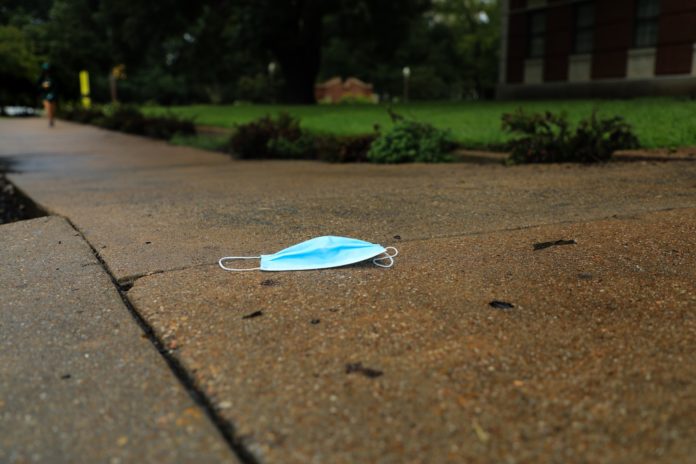By Sarah Pinkerton | Staff Writer
With the requirement for students, faculty and staff to wear masks while on campus, many individuals have opted to purchase and wear disposable masks. These masks, however, could negatively affect the environment.
According to Grand View Research, the disposable mask market has exceeded a value of $74.9 billion in Quarter One of 2020. With this growth of disposable mask use comes a growth of mask litter.
Katy senior Christine Snow, president of the Students for Environmental and Wildlife Protection, said that she has noticed disposable masks laying on the ground throughout campus.
“The other day I was walking, and I saw at least four on the street and in the grass and none of this stuff is biodegradable,” Snow said. “It’s not going to go away like a banana peel does.”
Dr. Susan Bratton, professor in the Environmental Science department, said that while there’s not an overwhelming amount of mask waste, it still adds to the issue of plastic waste.
“We have microplastics everywhere in the watersheds, and of course the density increases when you’re in larger bodies of water but it’s pretty ubiquitous,” Bratton said.
Many of these masks are made of materials that can take hundreds of years to decay.
Dr. Melinda Coogan, temporary lecturer in the Environmental Science department, said that we are already seeing higher levels of plastic pollution in general.
“The increase of plastics is increasing the estrogen-mimicking compound leaching into systems too,” Coogan said.
Snow said that when things like plastic masks are found in places that aren’t used to litter, wildlife doesn’t know how to respond.
Many of these animals are unable to tell the difference between trash and their prey, causing them to choke on many pieces of litter.
“A lot of times when they get it caught in their neck, it’s just because they don’t know how to respond to this kind of stuff, so you’ll definitely see an increase in wildlife being negatively impacted by this because they’re negatively impacted by litter all the time,” Snow said.
There’s also an additional concern about how to properly dispose of masks.
Coogan said that 75% of used masks and other pandemic related wastes are expected to fill up landfills and end up in the ocean. However, a disposal system for masks has not yet been created, leading to confusion on how to properly dispose of masks.
Snow said that while it is important to recycle plastic to avoid impact to both terrestrial and aquatic life, these masks are not able to be simply placed in the recycling bin due to the live virus debris that may be found on them and difficulty to break down the material into a reusable substance.
“The process of recycling is you’re melting down the plastic and turning it into these tiny pellets and when it’s pure plastic, it’s easier to melt that down without there being other materials in it,” Snow said. “The masks are so combined with other materials that it’s difficult to melt that down and get these pellets that can be reused.”
Heather Clinton, staff nurse practitioner in Health Services, said that while surgical masks are more effective than cloth masks, she recommends that students throw their disposable masks away in trash cans for best safety measures.
“If you throw it in the trash and take out your trash once a week, there really shouldn’t be any other precautions that you should have to take,” Clinton said.
She also said that while it is possible for those that work with trash pick-up to contract the virus by touching trash, it’s more likely to be transmitted with person-to-person contact.
“Most people that are handling trash are using gloves or they’re using hand washing or hand sanitizing after they touch trash and that’s usually sufficient,” Clinton said.
Coogan and Bratton also encourage students and faculties to dispose of masks in trashcans as of now.
“The immediate benefit [of wearing masks] probably outweighs that [environmental] concern, but it would be nice if everyone would dispose of them properly,” Bratton said.
As there are many unanswered questions on the topic of proper mask disposal and long-term environmental impacts, Snow encourages students to aim to use reusable masks.
“If you’re not a healthcare worker and you don’t need these disposable masks, then try not to get them,” Snow said. “That’s just the best thing is try to find the reusable ones.”






